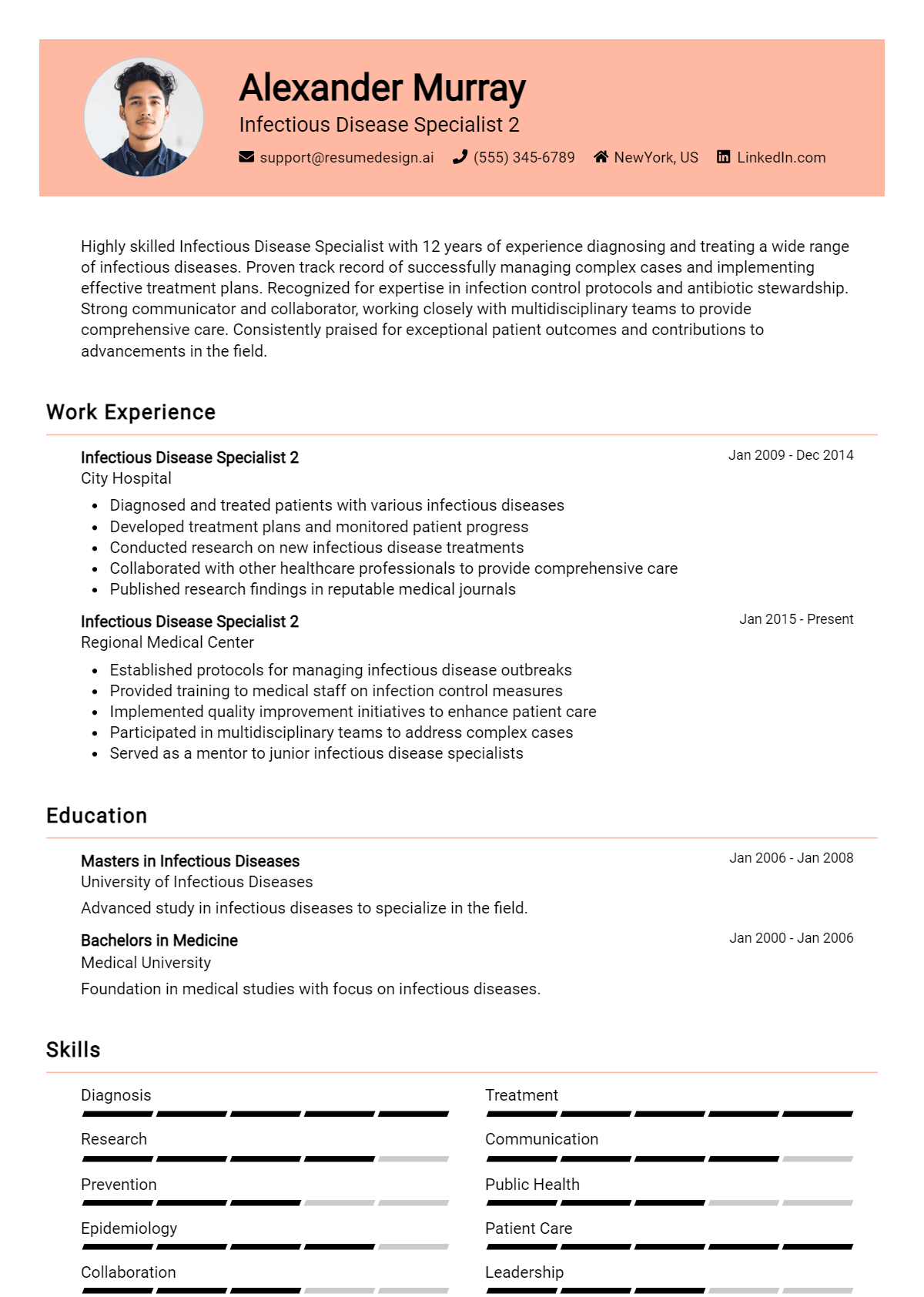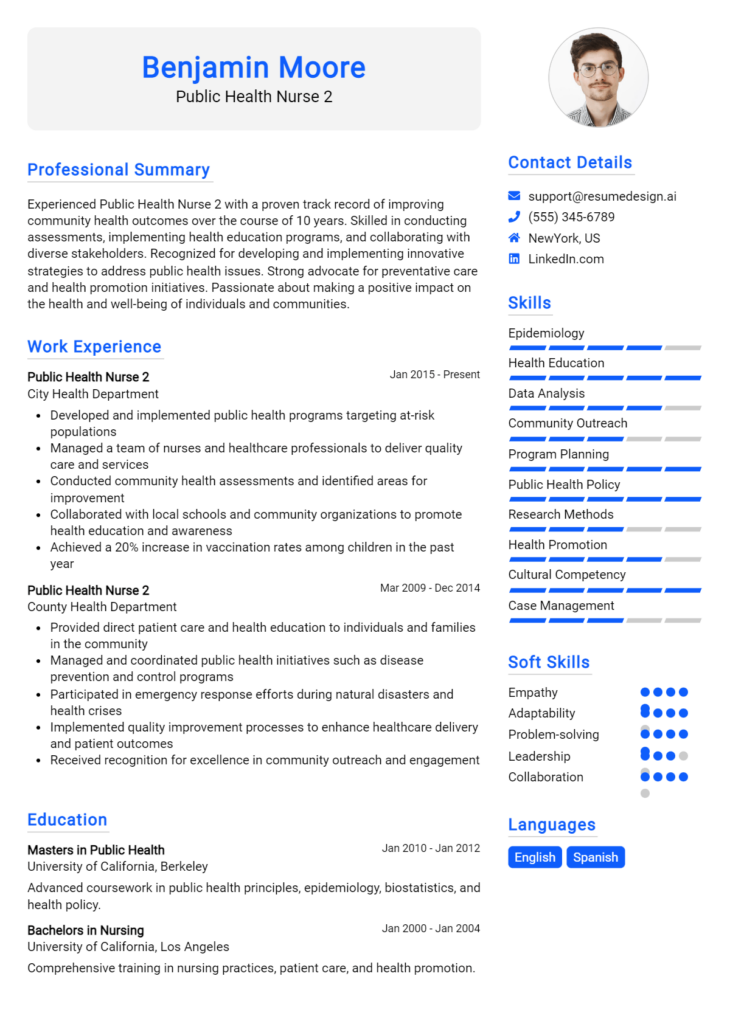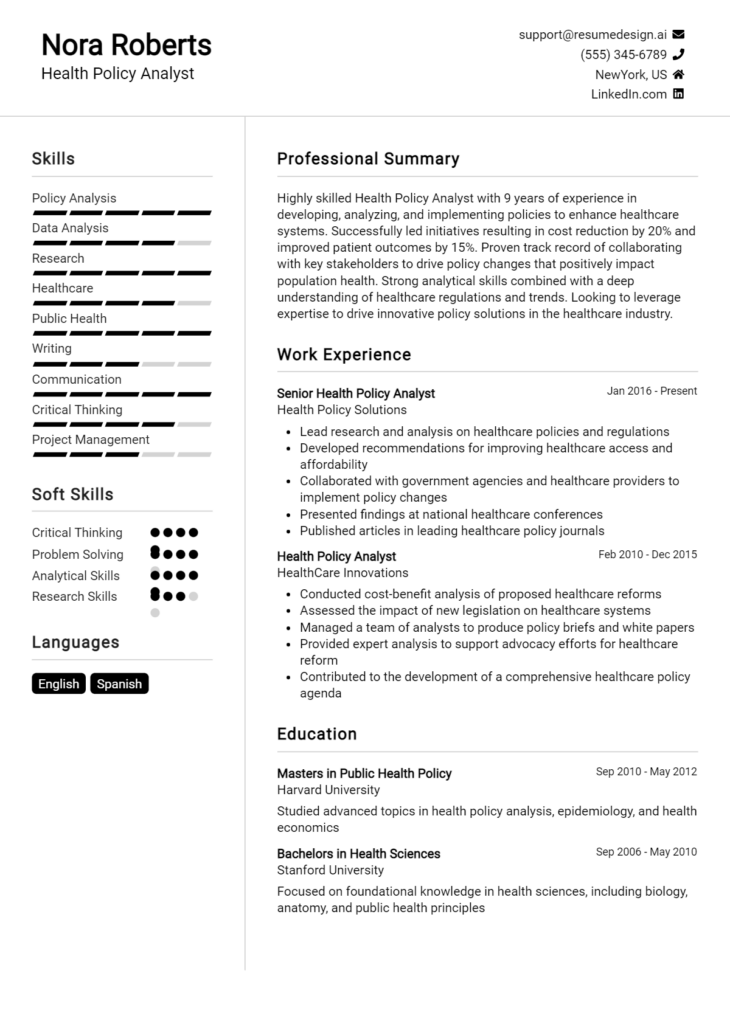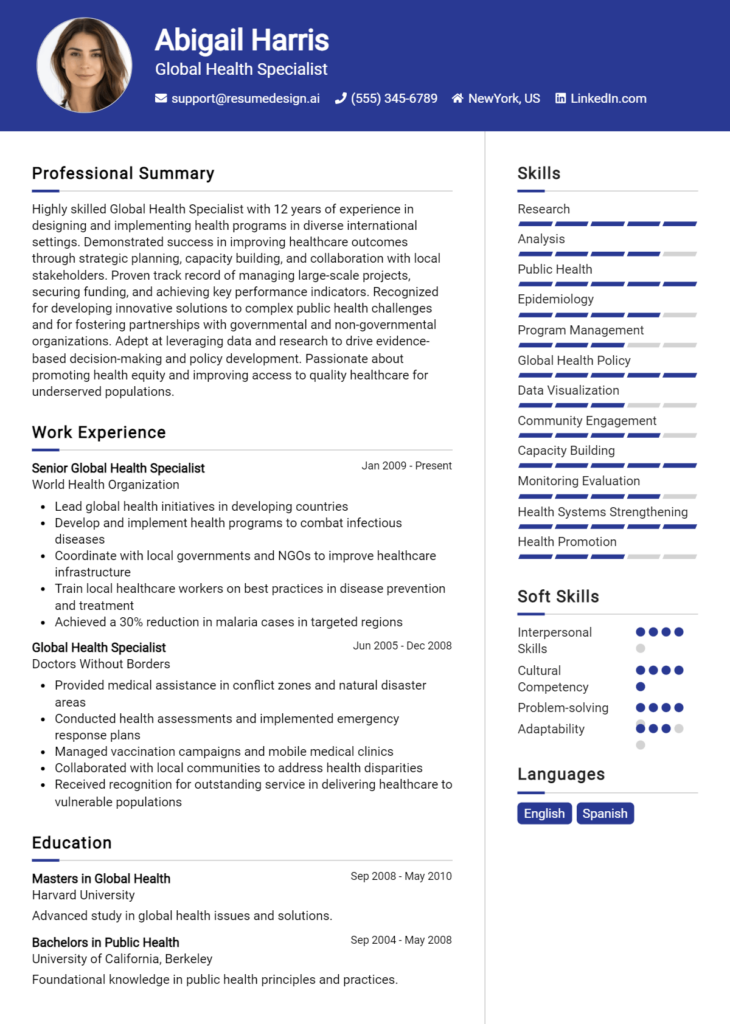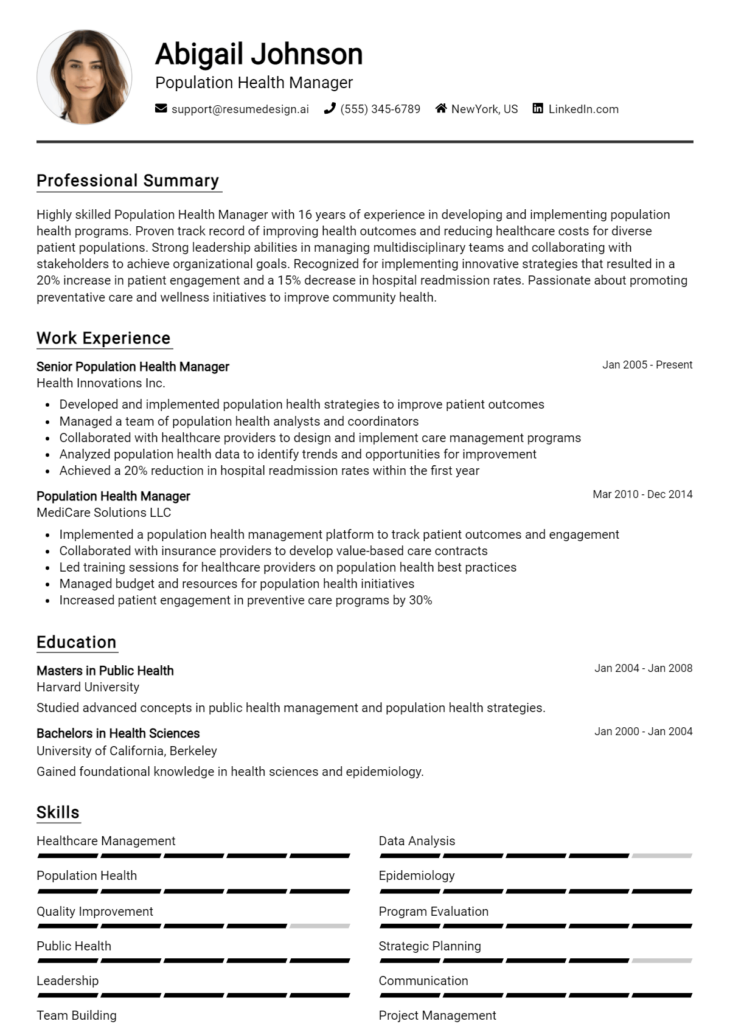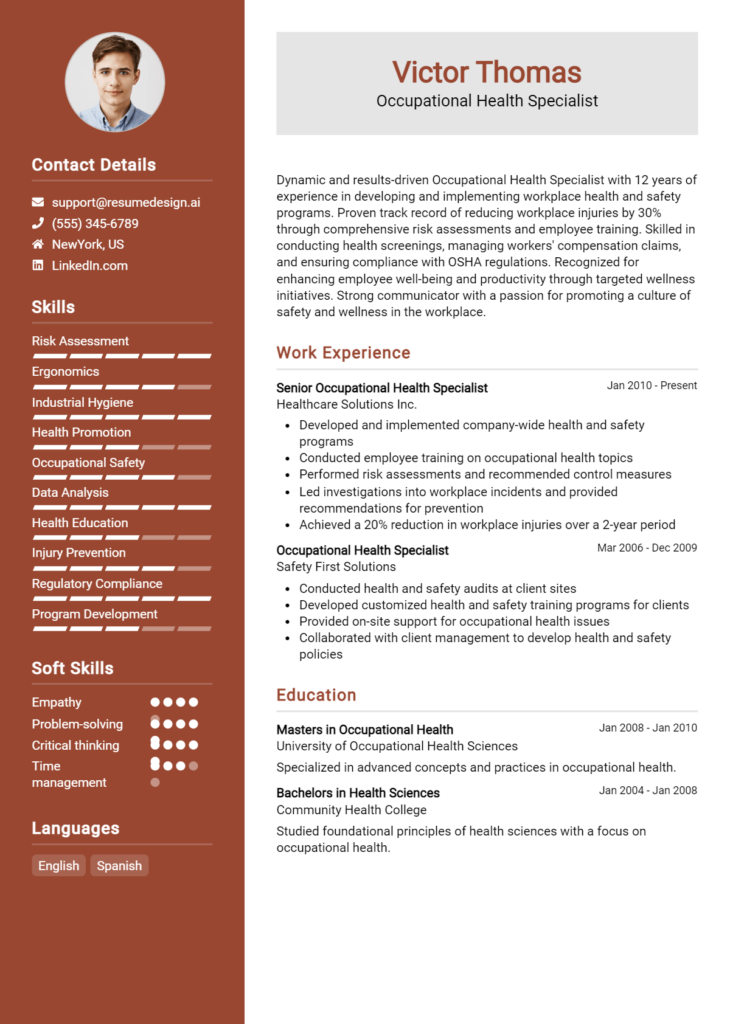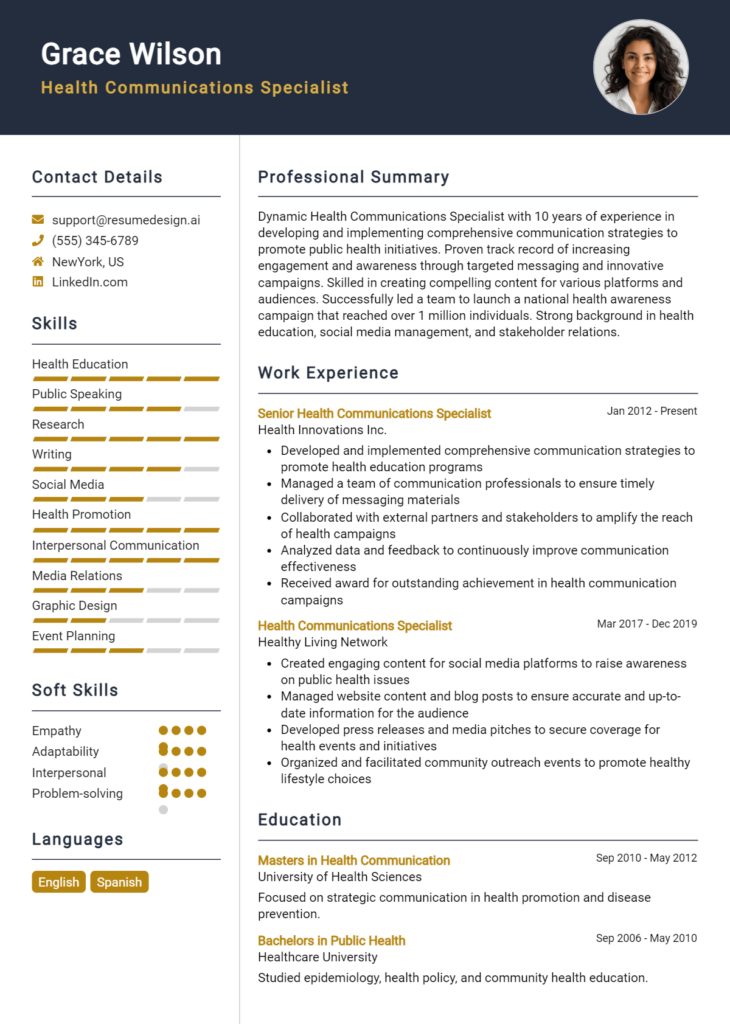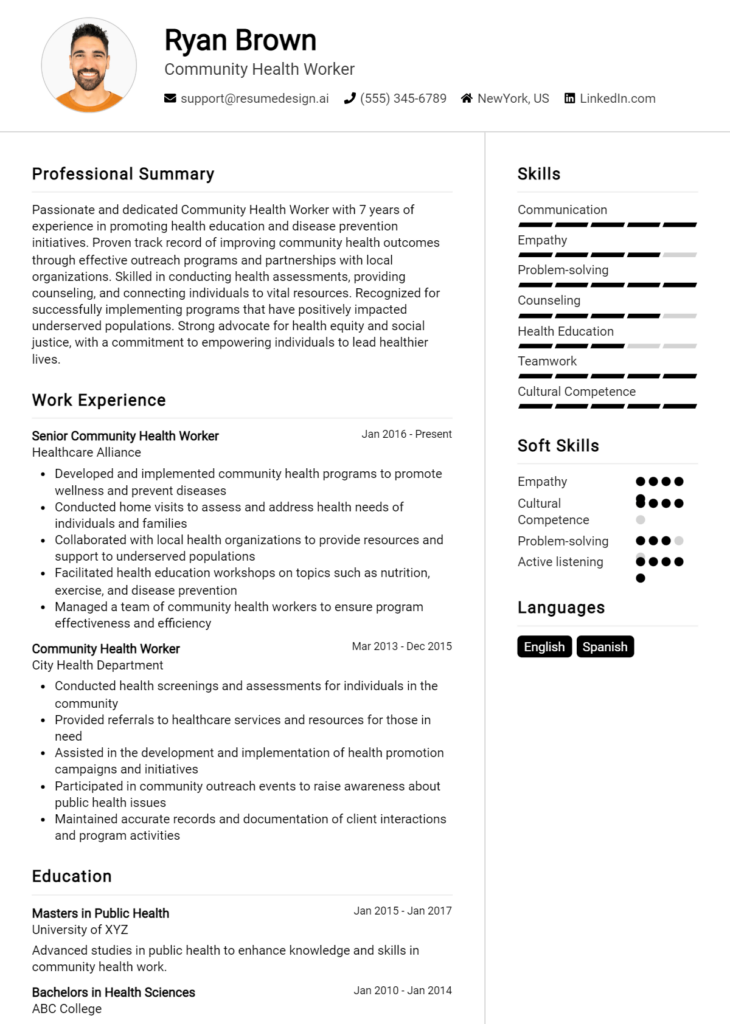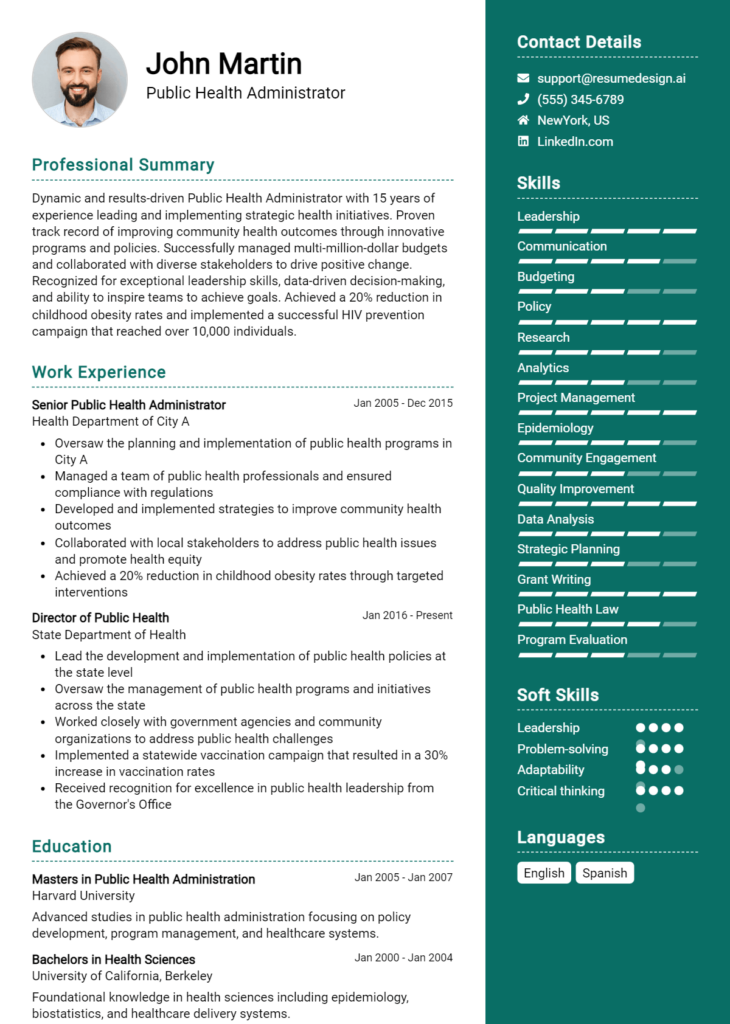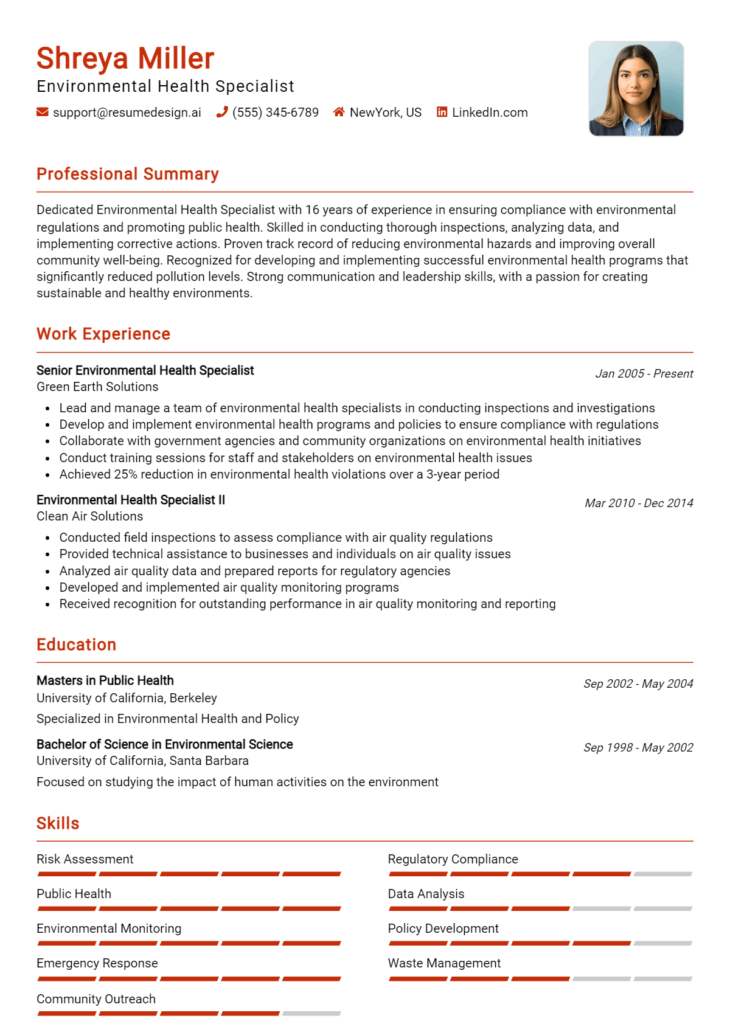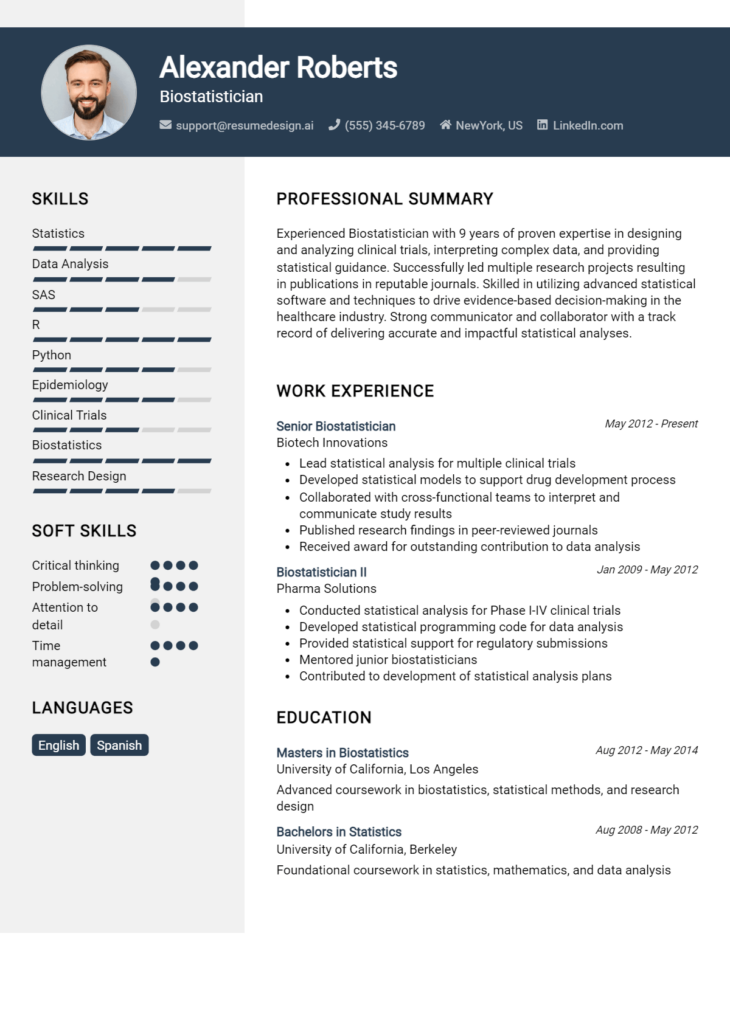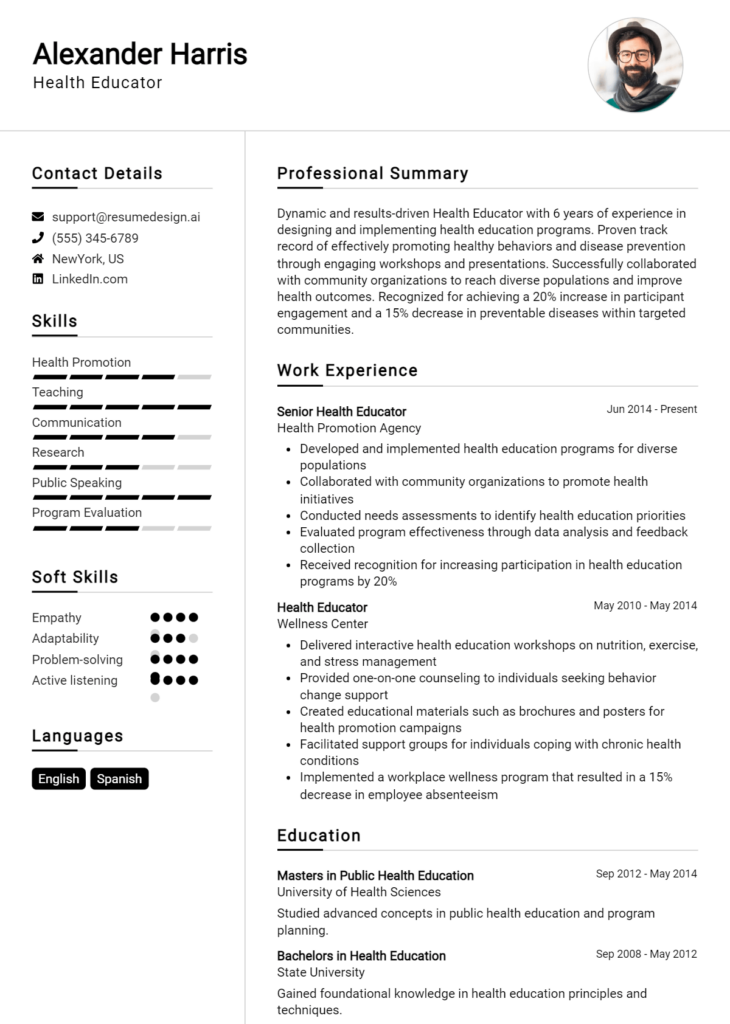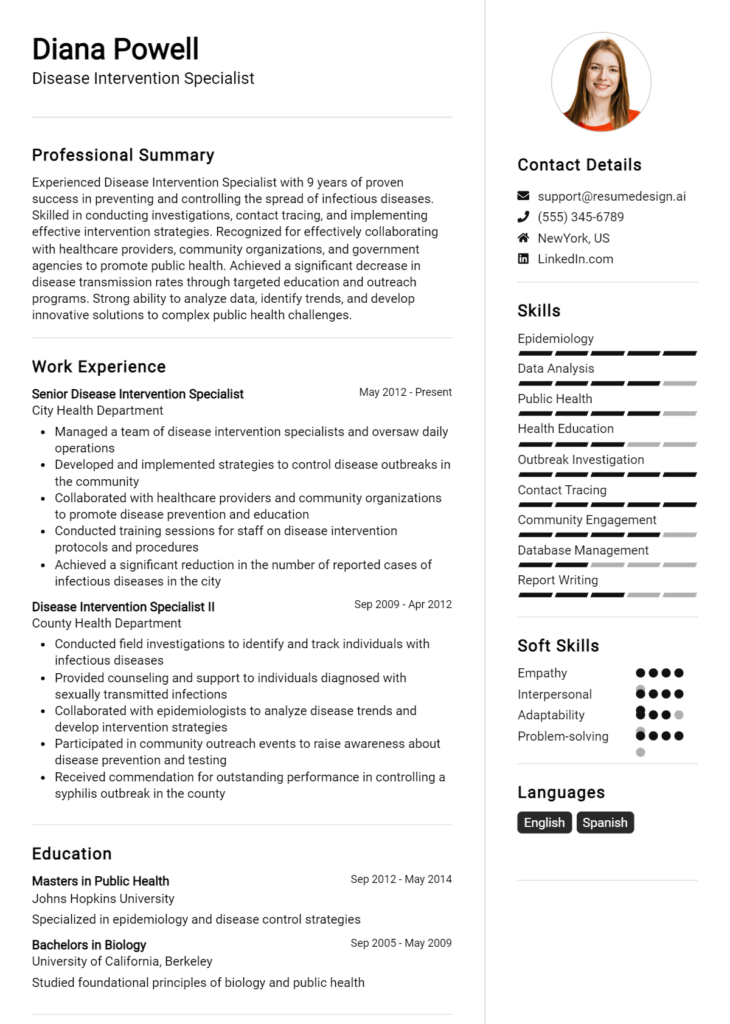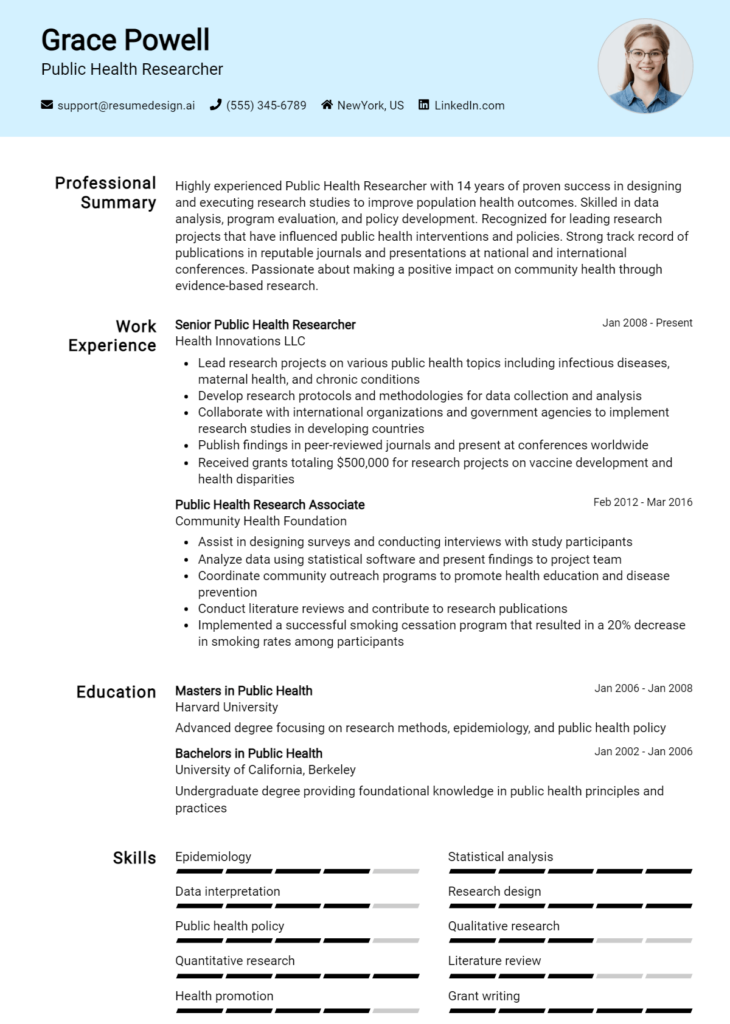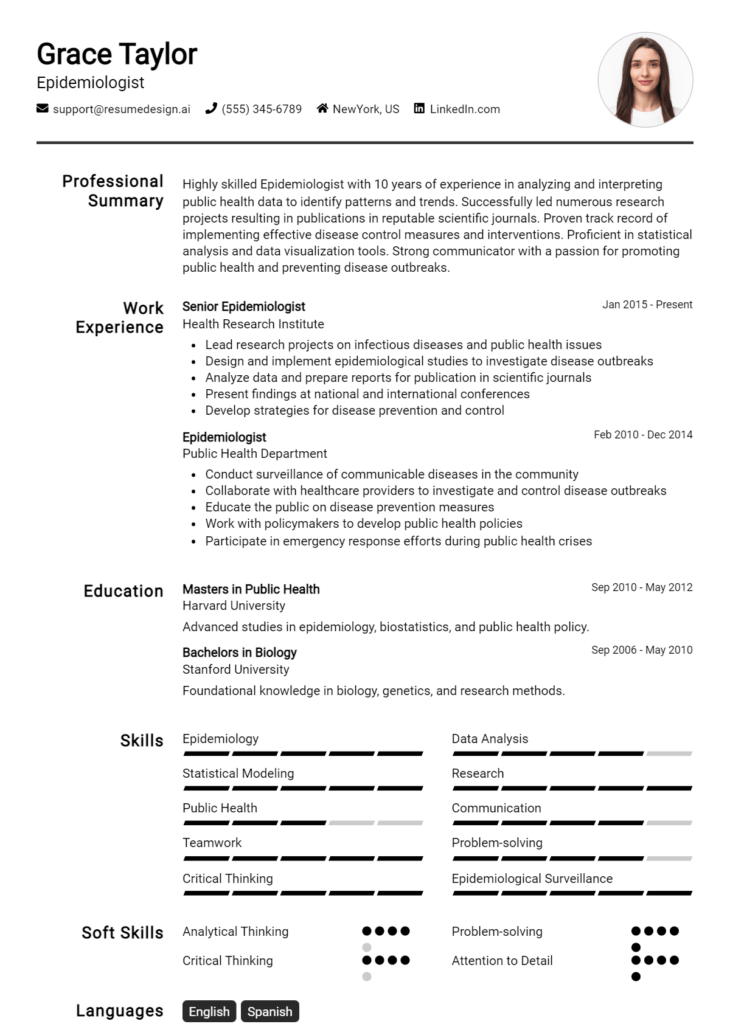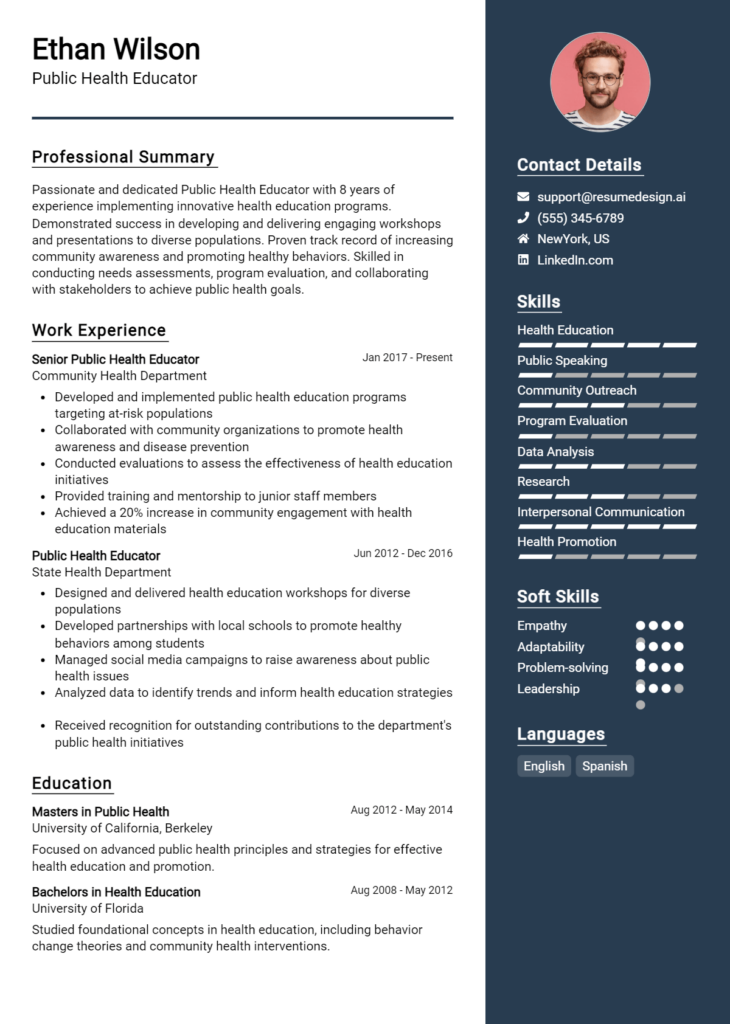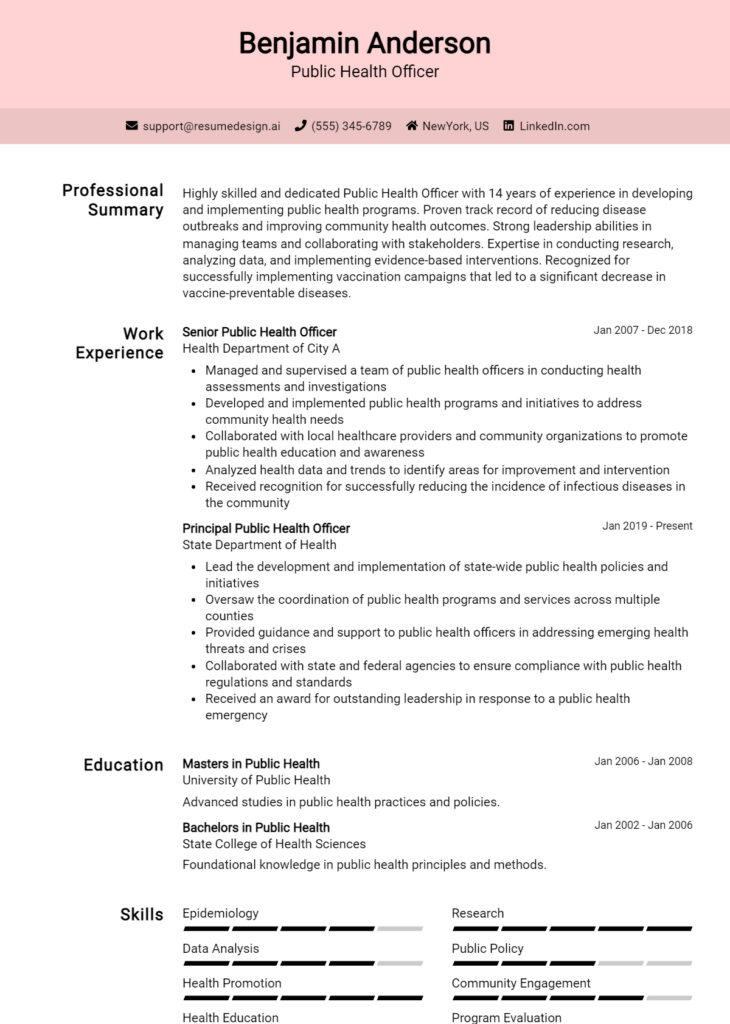Infectious Disease Specialist Core Responsibilities
An Infectious Disease Specialist plays a vital role in diagnosing, treating, and preventing infections, working collaboratively across departments such as microbiology, public health, and epidemiology. Key responsibilities include patient care, research, and infection control. Essential skills encompass technical expertise, operational acumen, and strong problem-solving abilities, all crucial for addressing complex health issues. A well-structured resume that highlights these qualifications can significantly enhance a candidate's appeal, contributing to the organization's goals of improved health outcomes and patient safety.
Common Responsibilities Listed on Infectious Disease Specialist Resume
- Diagnosing and treating infectious diseases in patients
- Conducting research on emerging infections and treatment methods
- Collaborating with healthcare teams to develop infection control protocols
- Providing education to patients and healthcare staff on infectious disease prevention
- Monitoring and reporting on infection rates within healthcare settings
- Utilizing laboratory data to guide treatment decisions
- Participating in the development of public health strategies
- Engaging in continuous medical education and training
- Consulting on travel medicine and vaccination protocols
- Evaluating new therapies and clinical trials for infectious diseases
- Managing antibiotic stewardship programs
- Advocating for policies to improve public health and safety
High-Level Resume Tips for Infectious Disease Specialist Professionals
In the competitive field of infectious disease specialization, a well-crafted resume is not just a document; it is often the first impression a potential employer will have of a candidate. Your resume serves as a critical marketing tool that showcases your professional journey, expertise, and accomplishments in a concise manner. It should effectively reflect your skills and achievements, making it clear why you are the ideal candidate for the role. This guide will provide practical and actionable resume tips specifically tailored for infectious disease specialist professionals, helping you to stand out in a crowded job market.
Top Resume Tips for Infectious Disease Specialist Professionals
- Tailor your resume to the specific job description, emphasizing keywords and phrases from the posting.
- Highlight relevant education, certifications, and training in infectious diseases and public health.
- Showcase your clinical experience, including the types of patients and diseases you have worked with.
- Quantify your achievements with specific metrics, such as the number of patients treated or research studies published.
- Include any involvement in outbreak investigations or public health initiatives, detailing your role and impact.
- Demonstrate your proficiency with laboratory techniques and technologies relevant to infectious disease diagnostics.
- Emphasize your collaboration with interdisciplinary teams, highlighting communication and teamwork skills.
- Feature any leadership roles or contributions to policy-making in infectious disease management.
- Utilize a clean and professional format that enhances readability and allows key information to stand out.
- Always proofread for grammatical accuracy and clarity, as attention to detail is crucial in this field.
By implementing these tips, you can significantly enhance your resume and increase your chances of landing a position in the infectious disease specialist field. A tailored and achievement-focused resume will not only highlight your qualifications but also convey your dedication and expertise to potential employers, positioning you as a strong candidate for the role.
Why Resume Headlines & Titles are Important for Infectious Disease Specialist
In the competitive field of infectious disease specialists, a well-crafted resume headline or title serves as a powerful tool for candidates to capture the attention of hiring managers immediately. A strong headline succinctly summarizes a candidate's key qualifications and expertise, allowing them to stand out in a sea of applicants. By presenting an impactful phrase that is relevant to the specific role being applied for, candidates can effectively communicate their unique value proposition. This critical element of the resume should be concise and directly related to the job, ensuring that it resonates with the hiring team and sets the tone for the entire application.
Best Practices for Crafting Resume Headlines for Infectious Disease Specialist
- Keep it concise: Aim for a headline that is no longer than one or two lines.
- Be specific: Use terminology that reflects the infectious disease field and the role being applied for.
- Highlight key strengths: Incorporate skills, certifications, or experiences that are most relevant to the position.
- Use impactful language: Choose strong action verbs and descriptive adjectives that convey expertise and confidence.
- Align with job description: Tailor the headline to match keywords and phrases found in the job posting.
- Avoid jargon: While being specific is important, ensure that the language is easily understandable to a broad audience.
- Incorporate metrics or achievements: If applicable, include quantifiable accomplishments that showcase your success in the field.
- Stay professional: Maintain a formal tone appropriate for the healthcare industry.
Example Resume Headlines for Infectious Disease Specialist
Strong Resume Headlines
Dedicated Infectious Disease Specialist with 10+ Years of Experience in Epidemiology and Outbreak Management
Board-Certified Infectious Disease Physician Specializing in HIV/AIDS and Viral Infections
Results-Driven Infectious Disease Expert with Proven Track Record in Clinical Research and Patient Care
Weak Resume Headlines
Healthcare Professional Seeking Job
Infectious Disease Specialist Looking for Opportunities
The strong headlines are effective because they clearly communicate the candidate's qualifications, specific area of expertise, and years of experience, making them immediately relevant to the hiring manager. They utilize strong language and specific details that draw attention and convey a sense of professionalism. In contrast, the weak headlines fail to impress due to their vagueness and lack of specificity, which do not differentiate the candidate from others. These generic phrases do not convey any unique skills or achievements, making it difficult for hiring managers to see the value the candidate could bring to their organization.
Writing an Exceptional Infectious Disease Specialist Resume Summary
A resume summary is a critical component of an Infectious Disease Specialist's resume, serving as a powerful introduction that can quickly capture the attention of hiring managers. This brief yet impactful section highlights key skills, relevant experience, and notable accomplishments that align with the job role. A well-crafted summary not only summarizes a candidate’s qualifications but also sets the tone for the rest of the resume, making it essential for standing out in a competitive job market. It should be concise, tailored to the specific position being applied for, and designed to make a lasting impression.
Best Practices for Writing a Infectious Disease Specialist Resume Summary
- Quantify achievements to demonstrate impact, such as the number of patients treated or successful research outcomes.
- Focus on relevant skills that are in demand for the role, such as epidemiology, clinical research, and patient care.
- Tailor the summary to match the job description, using keywords and phrases that are specific to the position.
- Keep it concise, ideally between 2-4 sentences, to maintain the reader's attention.
- Highlight specific certifications or training that enhance your qualifications, such as board certifications or specialized fellowships.
- Emphasize collaborative experiences, showcasing your ability to work with multidisciplinary teams in clinical or research settings.
- Use action verbs to convey a sense of proactivity and leadership in your accomplishments.
- Avoid jargon or overly technical language that may not be understood by all readers, especially HR professionals.
Example Infectious Disease Specialist Resume Summaries
Strong Resume Summaries
Dedicated Infectious Disease Specialist with over 10 years of experience in managing complex patient cases, achieving a 95% patient satisfaction rating. Proven track record in advancing clinical research, leading to a 30% increase in successful treatment protocols.
Dynamic board-certified Infectious Disease Specialist skilled in epidemiological research and outbreak response, effectively reducing infection rates by 40% in a clinical setting. Adept at collaborating with public health agencies to implement preventative strategies.
Results-driven Infectious Disease Specialist with extensive experience in HIV/AIDS management and treatment, overseeing care for over 500 patients while maintaining adherence rates above 85%. Strong advocate for patient education and community outreach initiatives.
Weak Resume Summaries
Infectious Disease Specialist with experience in various medical settings. I am a team player and have worked with patients.
Skilled in infectious diseases and interested in working in a hospital environment. Looking to apply my knowledge to help patients.
The examples provided illustrate the differences between strong and weak resume summaries effectively. Strong summaries are specific, quantifiable, and relevant to the role, demonstrating clear achievements and skills that align with the demands of an Infectious Disease Specialist. In contrast, weak summaries tend to be vague, lacking quantifiable outcomes and failing to convey the candidate's actual impact or expertise, making them less compelling to hiring managers.
Work Experience Section for Infectious Disease Specialist Resume
The work experience section of an Infectious Disease Specialist resume is a critical component that provides potential employers with a comprehensive view of the candidate's professional background. This section serves as a platform for showcasing not only the technical skills acquired throughout their career but also their ability to manage teams and deliver high-quality results in various healthcare settings. By quantifying achievements and aligning their experiences with industry standards, candidates can effectively demonstrate their value and readiness to tackle the challenges associated with infectious diseases.
Best Practices for Infectious Disease Specialist Work Experience
- Highlight specific technical skills related to infectious disease management and research.
- Quantify results whenever possible, such as improvements in patient outcomes or reductions in infection rates.
- Showcase leadership roles in team settings, emphasizing collaboration and effective communication.
- Include relevant certifications and training that support your expertise in the field.
- Tailor your experience to align with the requirements of the job description.
- Use action verbs to convey your contributions and responsibilities clearly.
- Focus on continuous learning and professional development within the field of infectious diseases.
- Demonstrate your involvement in community outreach or public health initiatives related to infectious diseases.
Example Work Experiences for Infectious Disease Specialist
Strong Experiences
- Led a multidisciplinary team in the development and implementation of a hospital-wide infection control program, resulting in a 30% decrease in hospital-acquired infections over two years.
- Conducted a comprehensive epidemiological study that identified key risk factors for a local outbreak, informing targeted interventions that reduced case incidence by 25%.
- Implemented a new electronic health record system that improved data accuracy and accessibility for infectious disease tracking, enhancing reporting efficiency by 40%.
- Facilitated training sessions for healthcare staff on the latest infectious disease protocols, leading to a 50% increase in compliance with hygiene standards.
Weak Experiences
- Worked on various infection-related projects.
- Assisted in managing patients with infectious diseases.
- Participated in team meetings about disease control.
- Helped implement infection prevention strategies.
The examples provided illustrate the difference between strong and weak work experiences. Strong experiences are characterized by specific, quantifiable outcomes and demonstrate clear leadership and collaborative efforts. They provide a detailed account of the candidate's contributions and impact, showcasing their expertise and effectiveness in the field of infectious diseases. In contrast, weak experiences lack detail and specificity, making it difficult for employers to gauge the candidate's actual skills and achievements. This highlights the importance of presenting concrete examples that reflect a candidate's true capabilities and successes.
Education and Certifications Section for Infectious Disease Specialist Resume
The education and certifications section of an Infectious Disease Specialist resume is crucial as it underscores the candidate's academic background, relevant industry certifications, and commitment to continuous professional development. This section serves as a testament to the candidate's qualifications and expertise, illustrating their preparedness to tackle complex infectious disease challenges. By providing precise information about relevant coursework, certifications, and specialized training, candidates can significantly enhance their credibility and demonstrate alignment with the demands of the role, making them stand out in a competitive job market.
Best Practices for Infectious Disease Specialist Education and Certifications
- Include only relevant degrees, such as MD, DO, or advanced degrees in public health or microbiology.
- List industry-recognized certifications, such as Board Certification in Infectious Disease or American Academy of Pediatrics (AAP) certification.
- Detail specialized training programs, fellowships, or internships that are pertinent to infectious diseases.
- Highlight continuing education courses that relate to recent advancements in infectious disease management.
- Use specific terminology and keywords that align with job descriptions to enhance visibility in applicant tracking systems (ATS).
- Provide context for certifications by indicating the issuing organization and expiration date if applicable.
- Organize the information in reverse chronological order to showcase the most recent and relevant qualifications first.
- Consider including honors or awards received during educational pursuits that emphasize excellence in the field.
Example Education and Certifications for Infectious Disease Specialist
Strong Examples
- Doctor of Medicine (MD) from Johns Hopkins University School of Medicine, 2018
- Board Certified in Infectious Disease, American Board of Internal Medicine, 2020
- Fellowship in Infectious Disease at Mayo Clinic, completed 2021
- Certificate in Global Health and Infectious Diseases from Harvard University, 2022
Weak Examples
- Bachelor of Arts in Sociology from State University, 2010
- Certification in Basic Life Support (BLS), expired 2019
- Online course on General Health Topics from a non-accredited institution, completed 2023
- High School Diploma, 2006
The strong examples are considered effective because they reflect advanced education and relevant certifications directly tied to the field of infectious diseases, showcasing a solid foundation of expertise and ongoing professional development. In contrast, the weak examples highlight qualifications that do not align with the demands of the role, such as unrelated degrees or expired certifications, which could undermine the candidate's credibility and relevance in the infectious disease specialty.
Top Skills & Keywords for Infectious Disease Specialist Resume
In the competitive field of infectious disease management, a well-crafted resume is essential for showcasing your qualifications and expertise. The skills section of your resume plays a crucial role in highlighting your capabilities and ensuring that you stand out to potential employers. As an Infectious Disease Specialist, both hard and soft skills are vital for effective patient care, research, and collaboration with multidisciplinary teams. By emphasizing the right combination of skills, you can demonstrate your proficiency in diagnosing and managing infectious diseases, while also showcasing the interpersonal abilities that foster teamwork and communication.
Top Hard & Soft Skills for Infectious Disease Specialist
Soft Skills
- Strong communication abilities
- Empathy and compassion
- Problem-solving skills
- Critical thinking
- Team collaboration
- Adaptability to changing environments
- Attention to detail
- Leadership qualities
- Time management
- Cultural competence
Hard Skills
- Proficiency in laboratory techniques
- Knowledge of epidemiology
- Expertise in clinical research methods
- Data analysis and interpretation
- Familiarity with infection control protocols
- Ability to perform diagnostic tests
- Proficiency in electronic medical records (EMR) systems
- Understanding of public health policies
- Experience with vaccination programs
- Knowledge of antimicrobial resistance
By incorporating these essential skills into your resume, along with a focus on relevant work experience, you can effectively convey your qualifications as an Infectious Disease Specialist and enhance your chances of securing your desired position.
Stand Out with a Winning Infectious Disease Specialist Cover Letter
Dear [Hiring Manager's Name],
I am writing to express my interest in the Infectious Disease Specialist position at [Company/Organization Name] as advertised [where you found the job listing]. With a robust background in infectious diseases and a passion for enhancing patient outcomes, I am excited about the opportunity to contribute to your team. My comprehensive training and experience in diagnosing, treating, and researching various infectious diseases have equipped me with the skills necessary to excel in this role.
In my previous position at [Previous Employer Name], I successfully managed a diverse patient population, providing evidence-based care and developing tailored treatment plans. My experience includes leading multidisciplinary teams in clinical settings, where I focused on the prevention and management of infectious diseases, including HIV, tuberculosis, and novel pathogens. Additionally, I have actively participated in public health initiatives aimed at increasing community awareness and vaccination efforts, further demonstrating my commitment to improving public health outcomes.
My research contributions, which have been published in several peer-reviewed journals, focus on emerging infectious diseases and antibiotic resistance. This work has not only enhanced my analytical and problem-solving skills but also underscored the importance of staying at the forefront of medical advancements. I am eager to bring my expertise in clinical research and patient care to [Company/Organization Name], ensuring that we continue to provide exceptional care while addressing the challenges posed by infectious diseases.
I am enthusiastic about the possibility of joining your esteemed organization and contributing to your mission of promoting health and well-being in the community. Thank you for considering my application. I look forward to the opportunity to discuss my qualifications further and explore how I can support your team in delivering outstanding infectious disease care.
Sincerely,
[Your Name]
[Your Phone Number]
[Your Email Address]
Conclusion
As an Infectious Disease Specialist, your role is crucial in diagnosing, treating, and preventing infections. It involves staying abreast of the latest research, understanding complex disease mechanisms, and collaborating with other healthcare professionals to provide optimal care. The skills you need include strong analytical abilities, excellent communication, and a thorough understanding of microbiology and epidemiology.
In your career, showcasing your expertise and experience effectively through your resume is essential. Highlight your specialized training, relevant work experience, and any research contributions that demonstrate your commitment to the field. Tailoring your resume to reflect the specific requirements of the job you’re applying for can significantly enhance your chances of landing interviews.
To ensure your resume stands out, consider utilizing various resources available to you. Explore resume templates that can help you format your information professionally and attractively. A resume builder can guide you through the process, making it easier to create a polished document. Additionally, reviewing resume examples can provide inspiration and a clearer understanding of what employers are seeking. Don’t forget to complement your resume with a strong cover letter using our cover letter templates to make a lasting impression.
Take action now—review your Infectious Disease Specialist resume and utilize these tools to enhance your job application. Your expertise is vital in the healthcare field, and presenting it effectively can open doors to new opportunities.

